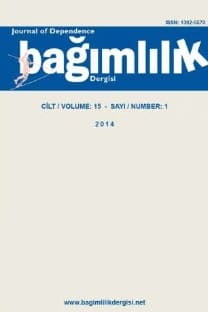Opioid yoksunluk deliryumunun klinik görünümünü karmaşıklaştıran beyin apsesi: olgu sunumu
A brain abscess complicating the clinical profile of opioid withdrawal delirium: a case report
___
- 1- Taylor D, Lewis S. Delirium. J Neurol Neurosurg Psychiatry 1993; 56: 742-751.
- 2- Kaplan HI, Sadock BJ (editors). Delirium, Dementia, and Amnestic and Other Cognitive Disorders and Mental Disorders Due to a General Medical Condi- tion. Kaplan and Sadock’s Synopsis of Psychiatry. 8. Baskı, Baltimore: Willams & Wilkins, 1998: 320-328.
- 3- Amerikan Psikiyatri Birliği. Mental Bozuklukların Tanısal ve Sayımsal El Kitabı, Köroğlu E (Çeviren). Yeniden Gözden Geçirilmiş 4. Baskı (DSM-IV-TR), Ankara: Hekimler Yayın Birliği, 2001: 75-76.
- 4- Kaplan HI, Sadock BJ (editors). Delirium, Demen- tia, and Amnestic and Other Cognitive Disorders and Mental Disorders Due to a General Medical Condition. Kaplan and Sadock’s Comprehensive Textbook of Psychiatry. 8. Baskı, Baltimore: Wil- lams & Wilkins, 2005: 1060.
- 5- Greenberg MS. Handbook of Neurosurgery. 5. Baskı, New York: Thieme, 2001: 217-223.
- 6- Bayraktar E. Deliryum, demans, amnestik ve diğer kognitif bozukluklar. Güleç C, Köroğlu E (editör- ler). Psikiyatri Temel Kitabı. 1. Baskı, Ankara: He- kimler Yayın Birliği, 1997: 227.
- 7- Curyto KJ, Johnson J, Tenhave T, et al. Survival of hospitalized elderly patients with delirium. Am J Geriatr Psychiatry 2001; 9: 141-147.
- 8- American Psychiatric Association. Practice guide- line for the treatment of patients with delirium. Am J Psychiatry 1999; 156 (Suppl. 5): 1-20.
- 9- Tune LE. Anticholinergik effects of medication in elderly patients. J Clin Psychiatry 2001; 62: 11-14. 10- Bradley WG, Daroff RB, Fenichel GM, Marsden CD (editors). Delirium. Neurology in clinical practice. 3. Baskı, Boston: Butterworth-Heinemann, 2000: 25-36.
- 11- Mampalam TJ, Rosenblum ML. Trends in the ma- nagement of bacterial brain abscess: A review of 102 cases over 17 years. Neurosurgery 1988; 23: 451-458.
- 12- Erdinçler P, Canbaz B, Suna D, ve ark. Brain abs- cesses review of 97 cases. Turkish Neurosurgery 1997; (3-4): 55-62.
- 13- Donald PL, Patrica DB. Infections in Injection Drug Users. Mandell GL, Bennett JE, Dolin R (editors). Mandell, Douglas and Bennett’s principles and practice of infectious diseases. 6. Baskı, New York: Elsevier Churchill Livingstone, 2005: 3471-3472.
- 14- Sichizya K, Fieggen G, Taylor A, Peter J. Brain abs- cesses--the Groote Schuur experience. S Afr J Surg 2005; 43: 79-82.
- 15- Kadıoğlu HH, Deniz O, Tüzün Y, ve ark. Cerebellar abscess. J Clin Neurosci 1997; 4: 447-450.
- 16- Bhand AA. Brain abscess--diagnosis and management. J Coll Physicians Surg Pak 2004; 14: 407-410.
- 17- Blanco GA, Garcia VE, Benito N, et al. Brain abscess. Clinicomicrobiologic study and prognostic analy- sis of 59 cases. Rev Clin Esp 1998; 198: 413-419.
- 18- Kao PT, Tseng HK, Liu CP, et al. Brain abscess: cli- nical analysis of 53 casess. J Mikrobiol Immunol Infect 2003; 36: 129-136.
- 19- Sabuncuoğlu H, Açıkgöz CZ, Çaydere M, ve ark. Nocardia farcinica brain abscess: a case report and review of the literature. Neurocirurgia 2004; 15: 600-603.
- 20- O’Neill E, Fitzpatrick F, Smyth E. Nocardial brain abscess: an unusual cause of acut confusion. Ir Med J 2005; 98:116.
- 21- Doepp F, Schreiber SJ, Wandinger KP, at al. Multip- le brain abscesses following surgical treatment of a perianal abscess. Clin Neurol Neurosurg 2006; 108:187-190.
- 22- Ateşkan Ü. Yaşlı hastalarda deliryum. Koçar İH, Erikçi S, Baykal Y (editörler). Acil İç Hastalıkları. 1. Baskı, Ankara: GATA Basımevi, 2003: 676-687.
- ISSN: 1302-5570
- Yayın Aralığı: Yılda 4 Sayı
- Başlangıç: 2000
- Yayıncı: Galenos Yayınevi
Yatarak tedavi gören bağımlı hastalarda nüksün değerlendirilmesi
Aslıhan YAPICI, Rıdvan ÜNEY, Ömer SAATÇİOĞLU, Gözde CİĞERLİ, Duran ÇAKMAK
Madde kullanım bozukluklarında genetik: bir gözden geçirme
İki uçlu bozukluk ve madde kullanım bozukluğu: siklotimik mizaç yatkınlık belirleyici midir?
Ö. Ayhan KALYONCU, Yasemin ŞİMŞEK, Sermin KESEBİR
Deliryum tremens genç hastalarda görülür mü: beş olguyu içeren bir değerlendirme
Ö. Ayhan KALYONCU, Gültürk KÖROĞLU, Mansur BEYAZYÜREK, Hasan MIRSAL, Özkan PEKTAŞ
Adli tıp kurumunda incelenen afyon ve türevlerinde 1990 ile 2000 yılları arasındaki değişimler
Murat AKSU, Sadık TOPRAK, M. Kadir ÖZAĞ, İlhan ÇETİN, Ali YILDIRIM
Opioid yoksunluk deliryumunun klinik görünümünü karmaşıklaştıran beyin apsesi: olgu sunumu
Salih SELEK, Müslüm KUL, M. Cemal KAYA, Haluk A. SAVAŞ, Mehmet YUMRU
Denizli ili merkezindeki banka çalışanlarında tütün kullanım durumu ve sağlık sorunları
Ali İhsan BOZKURT, Nurhan Meydan ACIMIŞ, Mehmet BOSTANCI, Aysun ÖZŞAHİN
